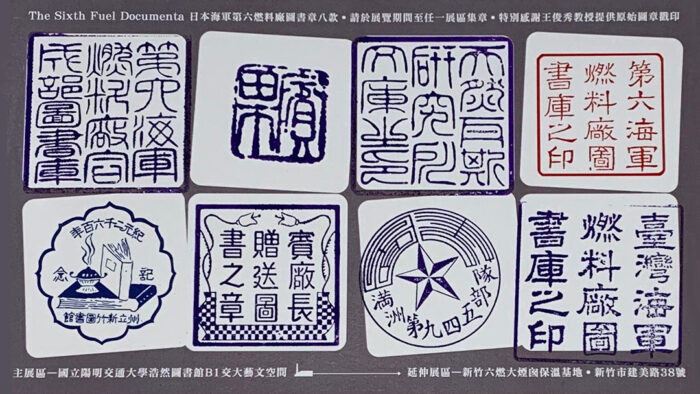我書故我在:圖書章中的燃料故事1
Books That Keep the Sixth Fuel Factory Alive:The Stories of Fuel in Book Stamps
王俊秀2 Chin-Shou Wangi
摘要 Abstract
在燃料史觀的脈絡下,日治時期新建於臺灣(高雄、新高與新竹)的臺灣海軍燃料廠(後編號為第六海軍燃料廠)即為能源轉型的歷史現場,並號稱「燃料中地」。燃料(石油、瓦斯、酒精等)的煉製過程為科學與科技的系統,支撐這個「燃料生態系統」的人、地、事、物(大分為東西與關係),有著各種故事。本文聚焦的「東西」為圖書,尤其圖書章具有宣示主權、時空壓縮、人書對話等特色。而「關係」即由六燃連結到天研、二燃、台拓、滿州燃料廠(石油部隊)、新竹研究所、資源委員會、高雄煉油廠等的歷史現場與歷史人物,故以「我書故我在」為題,其目的即以圖書來解讀其與空間與人物之間的關係。
Titled as “Books that Keep the Sixth Fuel Factory Alive,” this article seeks to investigate the entanglements among books, spaces, and people related to the factory from the perspective of book stamps. In the context of fuel history, the Japanese Navy’s Fuel Factory built during the Japanese colonial period in Taiwan (Kaohsiung, Niitaka, and Hsinchu), later numbered as the Sixth Fuel Factory, was known as a “central place of fuel” as well as a historical site that bears testimony to energy transition. The refinement of fuel (e.g.,oil, gas, and alcohol) is a scientific and technological process, while the people, places, events, and objects(roughly categorized into things and relations) that underpinned this “fuel ecosystem” recount a kaleidoscope of stories. The “things” that this article revolves around are books, especially book stamps that perform the functions such as claiming ownership, encapsulating space-time, and creating dialogues between readers and books. The “relations” that this article addresses include those between the Sixth Fuel Factory and associated historical sites and figures of the Natural Gas Research Institute, the Second Fuel Factory, the Taiwan Development Co., Ltd., the Manchurian Fuel Factory (oil troops), the Hsinchu Research Institute, the Resources Committee, and the Kaohsiung Refinery.
關鍵詞:新竹六燃、燃料生態系統、燃料中地、圖書章、時空壓縮
Keywords: The Sixth Fuel Factory in Hsinchu, Fuel ecosystem, Central place of fuel, Book stamp, Space-time
encapsulation
1. 本文部分內容引用自拙作:王俊秀。2022。〈第八章:圖書章中的歷史現場與人物〉,《新竹清華園的歷史現場》。國立清華大學出版社。
2. 清華大學人社學士班榮譽教授。
i. Emeritus Professor, Interdisciplinary Program of Humanities and Social Sciences, National Tsing Hua
University.


